UGC NET English Literature
English Cosmos is a premier institute of UGC NET English Literature in Jaipur India, established with the vision to empower the people, instill confidence, remove the language barrier, develop employability skills, and nurture and cultivate the potential in them.
Regular Classes
NOTES
TEST SERIES
Courses
Attributes of Cosmos Course
Here are some attributes to help you understand the crux of our course that we offer both online and offline:
4000+ Mock Test Questions
In the timeline, of course, we provide students with more than 4000 mock test questions in the form of weekly tests, google tests, and written tests to mark their performance.
Online & Offline doubt Sessions
No need to stress over unsolved mysteries of literature because we keep our students in the loop for the two doubt sessions weekly.
Time Saving Timetable
We make sure that our timetable for classes is not strenuous for students so that they can take the stress from their studies more.
Practical Sessions
We don’t make geeks here, so we prepare our students to become better professors in the future by initiating practical sessions in class or outside. Such as research paper reading, storytelling, teaching, and group drama visits to the theatre of Jaipur.
Follow-up Classes
Cosmos believes in confirming the base strength of a candidate, so follow-up classes are taken back-to-back in a week for strengthening base skills.
Previous Year Paper Discussion
This has become absolutely clear that most of the questions have been repeated over and over in NET exams, so we make sure that students must be aware of the ‘nature of the questions.
Inspiration Therapy
Aspirants are worthy of every chance they get, and we don’t want them to deprive of any such opportunities, hence, we schedule some Inspirational classes in a month to keep up the spirits of students.
Interactive Sessions
Interaction is key to sustaining the relationship between teacher and students. Thus, our faculty make sure that there should be constant interaction in the class. It also confirms the attention parameter of students.
Elemental Notes and Explanation
English Literature being a complex discipline, we have induced the simple notes with proper illustrations and examples that help you make a difference in the competition.
Bilingual Classes
The language becomes a barrier when students are not well acquainted with it, as often happens in the case of English. Hence, we make have started taking classes in both English and Hindi medium so that student does not feel alienated from all the teaching.
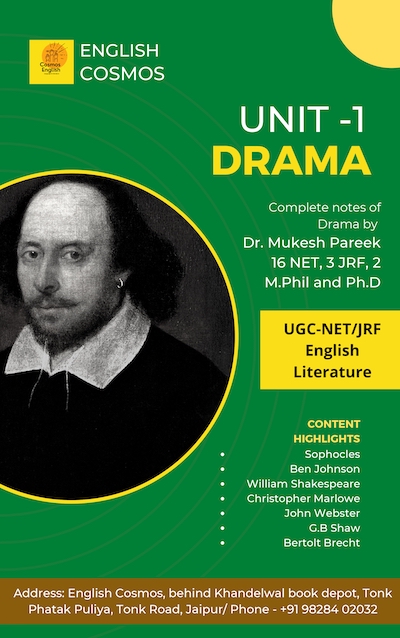
Unit I – Drama
- Content Highlights
We start drama section with Greek Dramatists, Morality, Miracle Plays, Ourstery Plays to first English play Gorboduc, Shakespeare to G. B. Shaw, including Restoration comedy etc. T. S. Eliot, Samuel Becket, John Osborne, Harold Pinter etc. all are the part of literary genre called Drama.Just imagine I teach every single line of Shakespeare and other dramatists. Students in a hurry are never selected. Look at the quotations in the exams. Ha Ha Ha Everything is not on the Internet

Unit II – Poetry
- Content Highlights
From Bede, ‘Beowulf’ to Chaucer, Shakespeare, Cavaliers, Metaphysical, Pope and Dryden, Pre-Romantics, Romantics, Victorian, Charles Baudelaire, War Poets, Modern Poets, Eliot, Yeats, Ted Hughes, Sylvia Plath, Gissing, Derek Walcott, poets from America, Latin America, Africa, India, European Continent etc. all are covered under the Poetry Genre.
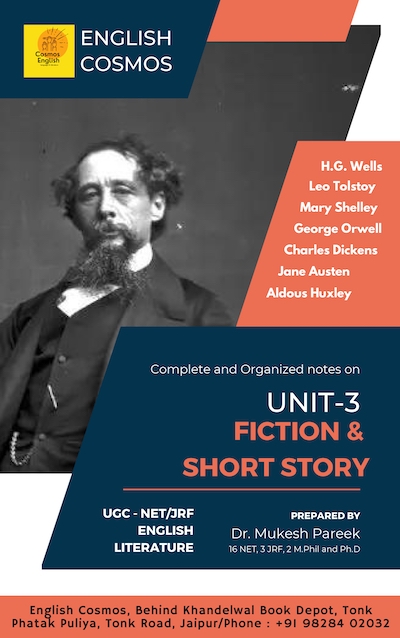
Unit III (A) Fiction
- Content Highlights
Romances like ‘Le Morte d’Arthur’ by Thomas Malory, Cervantes’s ‘Don Quixote’, Daniel Defoe, Richardson, Fielding, Jane Austen, Charles Dickens,Thomad Hardy Walter Scott, James Joyce, from ‘The Kite Runner’ (2003) to Kazuo Ishiguro ,all Nobel Prize Winners in this category are taught .Post-independence Indian novels, American novels and the World Classic Novels like _‘Madame Bovary’, ‘Godan’, Dalit Literature – Jhuthan, The Mother of 1084 (Hazaar Chaurasi Ki Maa (1998)) etc. all are the part of the genre called Fiction. Our classes are famous for detailed description, elaboration and quizzes on all famous fiction.

Unit III (B) - Short Story
- Content Highlights
Our book PDF on all the major short stories is bought even from Americans and Britishers.
Catherine Mansfield, Maupassant, Gogol Poe, Tagore, R. K. Narayan Mark Twain, John Steinbeck, Huxley, Fleming, R K Narayan, Faulkner, Anton Chekov, Kazuo Ishiguro, Chimamanda Adichie, Chinua Achebe all have written short stories and we have detailed notes and discussions on this topic to ensure the plot and character go in memory. Our notes on this topic and section are favourite among our students.
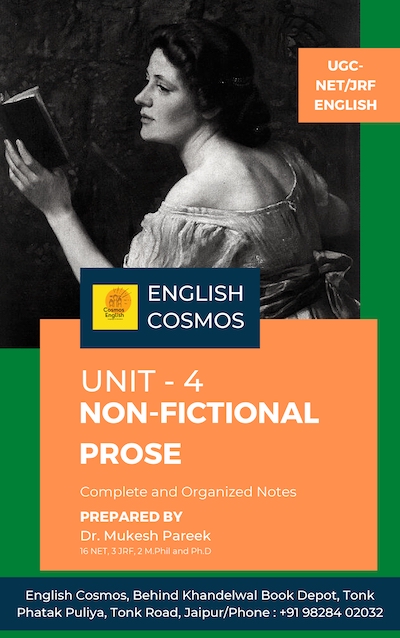
Unit IV Non-Fictional Prose
- Content Highlights
Utopia, Bacon’s ‘Essays’, diary Writers like Samuel Pepys (there was question from Pepys too that we studied) and John Evelyn, Addison, and Steele, Swift, Journals and Periodicals, Seamus Heaney (I discussed his BOG poems and look question from this lecture was also asked) (1975) etc, are the part of Non-Fictional Prose. We go to extra length to cover this section. After all we are creating future Professors of English Literature.

Unit V - Language Basic Concepts, Theories and Pedagogy, English in Use
- Content Highlights
(I discussed at length in three lectures different words that the English language has borrowed from Indian languages and CURRY, MANGOOSE were asked in the exam)
I have already written a book on this topic, so our students feel safe. Behaviourism, Cognitivism, Chomsky, Geoffrey Leech, Langue and Parole (remember two questions were asked on this directly), Speech Act Theory, Skills, Grammar, Parts of Speech, Linguistics, Grammar, Rise of English Language, French and Latin Influence, The Great Vowel Shift, Celtic Language, Medieval English, Modern English, their developments, Direct Method, Eclectic Method, Grammar Translation Method etc. Be ready for more than 10 questions on this topic.
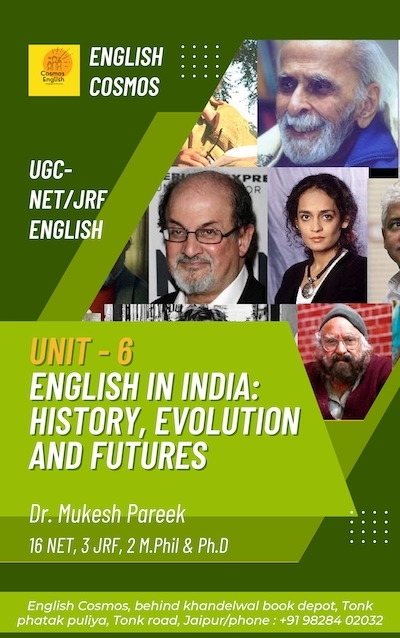
Unit VI - English in India, History and Evolution
- Content Highlights
I start this topic by the discussion and then use our special techniques to teach
Lord Macaulay’s Minutes, Kothari’s Three Language Formula, English as Official Language, the largest non-native English speakers of the World, registrar, Chutnification, Indianization of English language, native varieties, Hinglish, Tenglish, Tanglish, Supra-segmental features (stress-intonation-pronunciation etc.), etc. are the part of this unit and only one or couple of questions are asked on this section. Always they ask at least Two -three questions on these topics
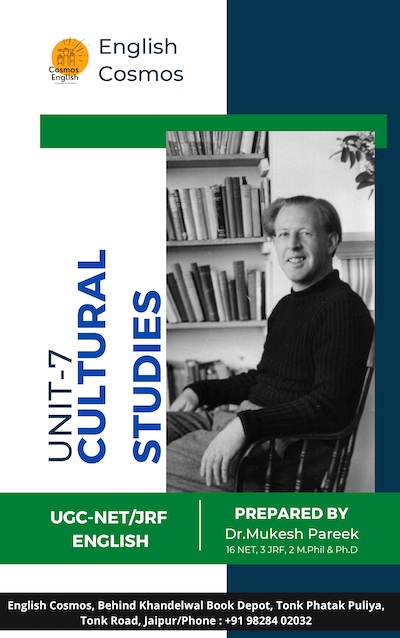
Unit VII – Cultural Studies
- Content Highlights
(Watch a series of YouTube videos prepared by me on all the writers in CULTURAL STUDIES) – Semiotics, Ethnography, Critical Race theory, Philosophy, theory, film/video studies, Communication Studies – Sender-Message-Receiver, Translators and Translation studies, neo-liberalism etc. are the part of this unit. Don’t underestimate this topic. We always work hard in our classrooms on these topics.

Unit VIII - Literary Criticism
- Content Highlights
Plato, Aristotle, Longinus, Sidney, Pope, Dr. Johnson, Swift, Wordsworth’s ‘Preface’, Coleridge’s ‘Biographia Literaria’, Mathew Arnold, Touch-stone Method, Freud, Modernism, T. S. Eliot, I. A. Richards, Empson, John Crow Ransom, Intentional and Affective Fallacies etc. – The Critics and Criticism is the part of the Pre II-World War and post II World War.
Our audio and video lectures solve the problems of our online students. But offline students are luckier. No need to say that you all found questions from the lectures as well as MCQs and PDF files. I said that notes are lengthy but don’t compromise with labour.

Unit IX - Literary Criticism Post World War
- Content Highlights
Formalism, Chicago School, New Aristotelian, New Left, Structuralism, Post-Structuralism, Reader-Response Theory, Post-Modernism, Historicism, New Historicism, Michel Foucault, Derrida, Barthes, Waves of Feminism, Apocalyptic Criticism, Absurdism and Existentialism, New Marxism, Meta-narrative, Colonialism and Post-colonialism, Imperialism, Orientalism, Eco-criticism, Post 9/11 World, ‘The Death of Postmodernism and Beyond’ by Alan Kirby (2006), Akker’s ‘meta modernism’ , Sokal Effect are the part of this unit. I as an EXPERT teach these topics at least twice in our classes both offline and online. I always ensure selection-based studies plus knowledge. Our book on these topics solves the need of our students.
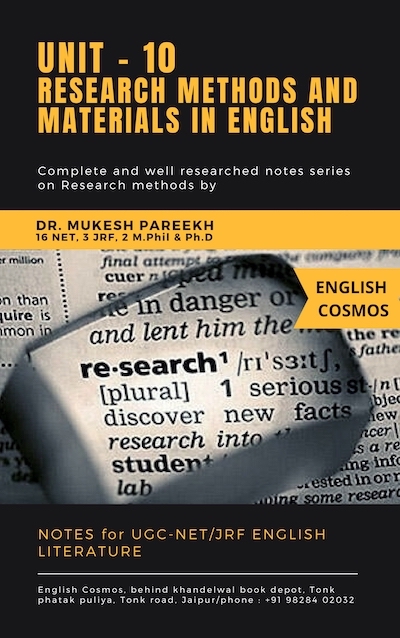
Unit X - Research Methods and Material in English
- Content Highlights
MLA Style Sheet. API, Plagiarism, Basic Research, Applied Research, Action Research, Scientific Research, Survey Method, Experimental Method, Descriptive Method, Inductive-Deductive Method, Hypothesis, Bibliography and citing, Plagiarism, Different kinds of test, Questionnaires, Observation and Case studies etc. All questions came from our classroom lectures when this topic was first introduced in the NET syllabus.
Our audio and video lectures solve the problems of our online students. But offline students are luckier. No need to say that you all found questions from the lectures as well as MCQs and PDF files. I said that notes are lengthy but don’t compromise with labour.
